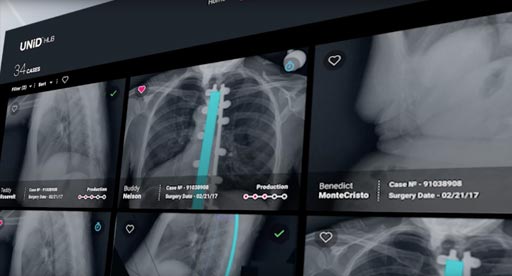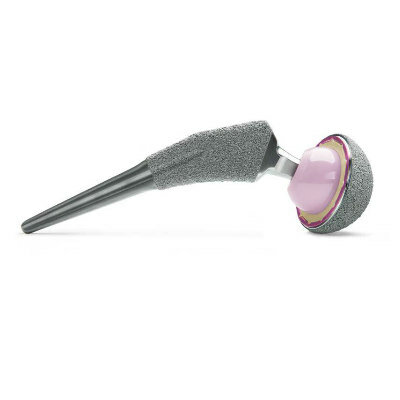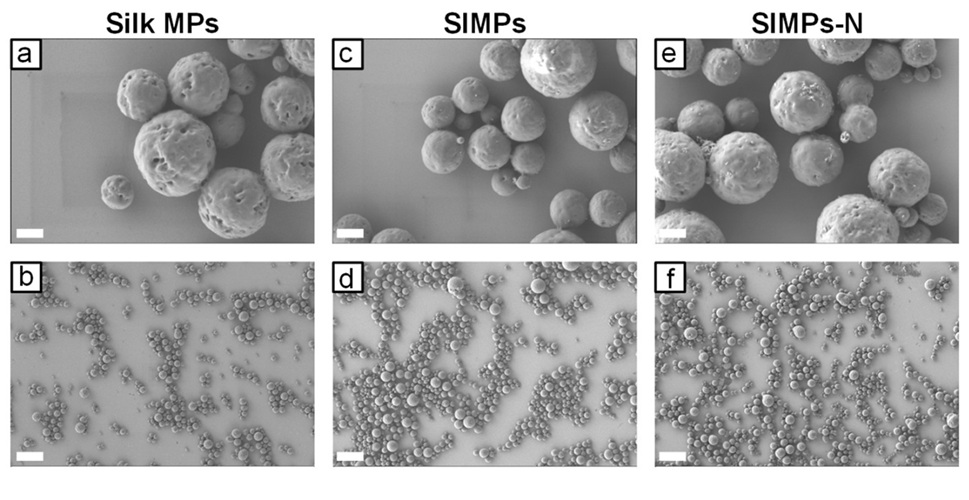Data-Driven Digital Portal Advances Spine Surgery
|
By HospiMedica International staff writers Posted on 04 Jul 2017 |

Image: The UNiD HUB digital spinal surgery planning software (Photo courtesy of Medicrea).
A novel software platform delivers predictive modeling resources to drive intelligent strategic decisions and create personalized surgical implant solutions.
The Medicrea (Neyron, France) UNiD HUB software is intended for digital surgical planning in spine surgery in order to create a seamless communication channel between UNiD LAB biomedical engineers and surgeon users in order to deliver UNiD TEK patient-specific spinal implants, which are manufactured by the company through proprietary rod bending and three dimensional (3D) printing techniques. UNiD HUB also serves to enhance existing proprietary technology utilized by the Medicrea UNiD Adaptive Spine Intelligence (ASI) platform.
The digital communication portal opened with the introduction of UNiD HUB creates a user-friendly environment for surgeons to identify tendencies and correlations, track and manage open cases in both snapshot and detailed views, access their complete patient history with post-operative analyses, and hold a dialogue with a dedicated biomedical engineer in real time. UNiD HUB was developed in desktop and mobile applications, and is accessible from medical offices as well as on the go.
“This new generation of software will be more than a communication tool for surgeons; it will grant surgeons access to the same data analytics and machine learning technology that is curated by our data scientists to use the UNiD HUB as an unparalleled research engine and networking platform,” said Denys Sournac, President and CEO of Medicrea. “The UNiD HUB represents Medicrea’s ability to lead the spine industry with breakthrough innovations by offering a unique forward-thinking and holistic approach to personalized spinal surgery.”
The UNiD TEK patient-specific spinal rod is pre-contoured and customized using a reproducible industrial process that eliminates the intraoperative use of a bending device. The UNiD HUB platform helps the surgeons preoperatively plan and order customized rods to fit the specific spinal alignment needed prior to surgery, thus reducing the amount of time patients spend in the operating room, which also directly impacts infection rate and quality of recovery.
The UNiD rods are available in two alloys (Titanium TA6V ELI or Cobalt Chromium), and two diameters (5.5 or 6 mm), matching global standards. The rods also fit into the PASS LP thoraco-lumbar fixation system, which also includes the UNiD anterior lumbar interbody fusion (ALIF) spine cages created with a three-dimensional (3D) printer. Specific software and advanced imaging are used to make the cages out of Poly Ether Ketone Ketone (PEKK) in order to reproduce the anatomic details of a patient’s vertebral endplates.
Related Links:
Medicrea
The Medicrea (Neyron, France) UNiD HUB software is intended for digital surgical planning in spine surgery in order to create a seamless communication channel between UNiD LAB biomedical engineers and surgeon users in order to deliver UNiD TEK patient-specific spinal implants, which are manufactured by the company through proprietary rod bending and three dimensional (3D) printing techniques. UNiD HUB also serves to enhance existing proprietary technology utilized by the Medicrea UNiD Adaptive Spine Intelligence (ASI) platform.
The digital communication portal opened with the introduction of UNiD HUB creates a user-friendly environment for surgeons to identify tendencies and correlations, track and manage open cases in both snapshot and detailed views, access their complete patient history with post-operative analyses, and hold a dialogue with a dedicated biomedical engineer in real time. UNiD HUB was developed in desktop and mobile applications, and is accessible from medical offices as well as on the go.
“This new generation of software will be more than a communication tool for surgeons; it will grant surgeons access to the same data analytics and machine learning technology that is curated by our data scientists to use the UNiD HUB as an unparalleled research engine and networking platform,” said Denys Sournac, President and CEO of Medicrea. “The UNiD HUB represents Medicrea’s ability to lead the spine industry with breakthrough innovations by offering a unique forward-thinking and holistic approach to personalized spinal surgery.”
The UNiD TEK patient-specific spinal rod is pre-contoured and customized using a reproducible industrial process that eliminates the intraoperative use of a bending device. The UNiD HUB platform helps the surgeons preoperatively plan and order customized rods to fit the specific spinal alignment needed prior to surgery, thus reducing the amount of time patients spend in the operating room, which also directly impacts infection rate and quality of recovery.
The UNiD rods are available in two alloys (Titanium TA6V ELI or Cobalt Chromium), and two diameters (5.5 or 6 mm), matching global standards. The rods also fit into the PASS LP thoraco-lumbar fixation system, which also includes the UNiD anterior lumbar interbody fusion (ALIF) spine cages created with a three-dimensional (3D) printer. Specific software and advanced imaging are used to make the cages out of Poly Ether Ketone Ketone (PEKK) in order to reproduce the anatomic details of a patient’s vertebral endplates.
Related Links:
Medicrea
Latest Surgical Techniques News
- Early TAVR Intervention Reduces Cardiovascular Events in Asymptomatic Aortic Stenosis Patients
- New Procedure Found Safe and Effective for Patients Undergoing Transcatheter Mitral Valve Replacement
- No-Touch Vein Harvesting Reduces Graft Failure Risk for Heart Bypass Patients
- DNA Origami Improves Imaging of Dense Pancreatic Tissue for Cancer Detection and Treatment
- Pioneering Sutureless Coronary Bypass Technology to Eliminate Open-Chest Procedures
- Intravascular Imaging for Guiding Stent Implantation Ensures Safer Stenting Procedures
- World's First AI Surgical Guidance Platform Allows Surgeons to Measure Success in Real-Time
- AI-Generated Synthetic Scarred Hearts Aid Atrial Fibrillation Treatment
- New Class of Bioadhesives to Connect Human Tissues to Long-Term Medical Implants
- New Transcatheter Valve Found Safe and Effective for Treating Aortic Regurgitation
- Minimally Invasive Valve Repair Reduces Hospitalizations in Severe Tricuspid Regurgitation Patients
- Tiny Robotic Tools Powered by Magnetic Fields to Enable Minimally Invasive Brain Surgery
- Magnetic Tweezers Make Robotic Surgery Safer and More Precise
- AI-Powered Surgical Planning Tool Improves Pre-Op Planning
- Novel Sensing System Restores Missing Sense of Touch in Minimally Invasive Surgery
- Headset-Based AR Navigation System Improves EVD Placement
Channels
Critical Care
view channel
AI Interpretability Tool for Photographed ECG Images Offers Pixel-Level Precision
The electrocardiogram (ECG) is a crucial diagnostic tool in modern medicine, used to detect heart conditions such as arrhythmias and structural abnormalities. Every year, millions of ECGs are performed... Read more
AI-ECG Tools Can Identify Heart Muscle Weakness in Women Before Pregnancy
Each year, some mothers die from heart-related issues after childbirth, with many of these deaths being preventable. Screening for heart weakness before pregnancy could be crucial in identifying women... Read morePatient Care
view channel
Portable Biosensor Platform to Reduce Hospital-Acquired Infections
Approximately 4 million patients in the European Union acquire healthcare-associated infections (HAIs) or nosocomial infections each year, with around 37,000 deaths directly resulting from these infections,... Read moreFirst-Of-Its-Kind Portable Germicidal Light Technology Disinfects High-Touch Clinical Surfaces in Seconds
Reducing healthcare-acquired infections (HAIs) remains a pressing issue within global healthcare systems. In the United States alone, 1.7 million patients contract HAIs annually, leading to approximately... Read more
Surgical Capacity Optimization Solution Helps Hospitals Boost OR Utilization
An innovative solution has the capability to transform surgical capacity utilization by targeting the root cause of surgical block time inefficiencies. Fujitsu Limited’s (Tokyo, Japan) Surgical Capacity... Read more
Game-Changing Innovation in Surgical Instrument Sterilization Significantly Improves OR Throughput
A groundbreaking innovation enables hospitals to significantly improve instrument processing time and throughput in operating rooms (ORs) and sterile processing departments. Turbett Surgical, Inc.... Read moreHealth IT
view channel
Printable Molecule-Selective Nanoparticles Enable Mass Production of Wearable Biosensors
The future of medicine is likely to focus on the personalization of healthcare—understanding exactly what an individual requires and delivering the appropriate combination of nutrients, metabolites, and... Read more
Smartwatches Could Detect Congestive Heart Failure
Diagnosing congestive heart failure (CHF) typically requires expensive and time-consuming imaging techniques like echocardiography, also known as cardiac ultrasound. Previously, detecting CHF by analyzing... Read moreBusiness
view channel
Expanded Collaboration to Transform OR Technology Through AI and Automation
The expansion of an existing collaboration between three leading companies aims to develop artificial intelligence (AI)-driven solutions for smart operating rooms with sophisticated monitoring and automation.... Read more

















